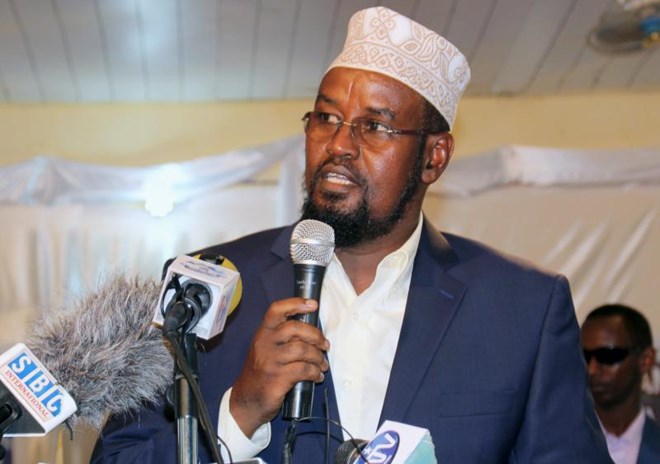The Arab Weekly
Saturday May 19, 2018
Members of the Somali opposition believe the government is tilting towards the Qatari-Turkish alliance.
 Jubaland President Ahmed Madobe speaks in the southern port town of Kismayu. (Reuters)
Jubaland President Ahmed Madobe speaks in the southern port town of Kismayu. (Reuters)
LONDON - In a move likely to further strain relations in the Gulf Cooperation Council (GCC), Qatari Emir Sheikh Tamim bin Hamad al-Thani hosted Somali President Mohamed Abdullahi Mohamed less than a month after the United Arab Emirates’ diplomatic row with Somalia over port leasing deals in various states.
On May 14, the two leaders met in Doha and discussed ways to promote joint cooperation between the two countries, according to Sheikh Tamim’s official Twitter account. “Qatar will continue its support for Somalia’s unity, stability and sovereignty, as well as the prosperity of its people,” Sheikh Tamim said in the tweet.
The visit by Mohamed and his delegation comes at a sensitive time in the region. The one-year anniversary of the GCC dispute over Doha’s alleged backing of terror groups and meddling in other states’ affairs is approaching and the recent diplomatic spat between Abu Dhabi and Mogadishu is still unresolved. Mohamed’s public statements of neutrality are also being challenged at home.
There are legitimate fears in Somali political circles about Doha’s track record on supporting extremist groups. Somalia’s ongoing fight against such groups was one of the UAE’s motivations for training and supporting local troops. Sources stressed that Mohamed’s Doha visit “cannot be separated from the problems created by the (Somali president’s) government with the UAE, which had adopted a proactive approach in its support for Somalia in order to help it overcome critical economic and security issues.”
According to local Somali reports, regional leaders in Somalia who differ with the president over his outreach to Qatar held a meeting to discuss the Gulf crisis during Mohamed’s meeting in Doha. The leaders at the meeting represented Puntland, Jubaland, Galmudug and HirShabelle and have in the past declared their support for the UAE’s initiatives in Somalia, particularly Abu Dhabi’s help in dealing with the al-Shabab terrorist organisation and its support for local economies.
Jubaland President Ahmed Madobe expressed his support for the UAE and accused Mohamed of double standards after arriving from Abu Dhabi last month.
“My idea is that we do not isolate Qatar but are we doing this in a systematic manner?” Madobe said. “The government has decided to align itself with Qatar,” he added, according to Mogadishu’s Goobjoog news.
Observers believe that the Qatari-Somali rapprochement is an indication that the dispute within the GCC is far from over, with countries vying for influence beyond the Gulf region. In April, the UAE cancelled its military training programme in Somalia in response to the grounding of a UAE plane carrying Emirati officials by Somali security forces and the seizure of funds — estimated to be close to $10 million — belonging to the UAE.
Emirati-Somali relations tumbled following the banning of UAE ports operator DP World from operating in Somalia. The firm, the world’s third-biggest container port operator, had signed a contract with the breakaway region of Somaliland to set up a port zone, which led to the Somalis’ action against DP World.
Pressure from Qatar and Turkey for Mogadishu to take a negative stance regarding UAE support has also factored into declining UAE-Somali relations. The cancelled UAE military training programme, which began in 2014, was aimed at strengthening the capabilities of the Somali Army. UAE forces have participated in training missions involving thousands of Somali soldiers. Before the UAE pulled the plug, it was paying the salaries of 2,407 Somali soldiers, had set up three training centres and a hospital and also sent Emirati medical teams to treat Somali military personnel.